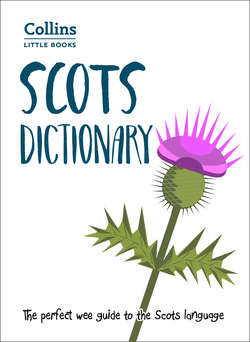Читать книгу Scots Dictionary: The perfect wee guide to the Scots language - Collins Dictionaries, Collins Dictionaries - Страница 20
Оглавлениеbuckie
buckie A buckie is a whelk, a type of shellfish with a snail-like shell, some varieties of which are edible. [The term comes from buccinum, the Latin name for a whelk]
Buckie Buckie is an informal name for Buckfast, a tonic wine (brewed in Buckfast Abbey, Devon), the cheapness and strength of which make it popular with those whose aim is to get drunk as quickly as possible: C’mon we’ll get blootered on Buckie before the game.
Buddy A person from Paisley is sometimes referred to as a Paisley Buddy. St Mirren, Paisley’s professional football team, are nicknamed the Buddies. [The word comes from the pronunciation of the Scots word body, a person]
Bully Wee The Bully Wee is the nickname of Clyde football team. [The name comes from bully, an old-fashioned term meaning fine or admirable, plus wee reflecting the fact that Clyde were always one of the less powerful and successful of the Glasgow teams. (They now play in Cumbernauld)]
bum To bum is to boast or brag. A boaster or conceited person can be spoken of contemptuously as a bum. [These senses come from the earlier Scots sense, to make a humming or buzzing noise]
bumbaleerie (bum-bah-leer-ree) The bumbaleerie is an informal, often jocular, term for the backside.
bumfle A bumfle is a wrinkle, crease, or fold in something. If something is bumfled or bumfled up, it is untidily wrinkled or creased: My skirt had got all bumfled up at the back. [The word comes from the earlier Scots bumph meaning a lump or bump]
bummer In informal speech, a heid bummer is someone who holds a position of power or authority in a place or organization: The site gaffer told his men to make an effort because lots of heid bummers drive past there.
bum up To bum something up is to claim that it is very good, or to make it out to be better than it really is: Ach, it was okay, but it’s no all it’s bummed up to be.
bunnet The word bunnet usually refers to a man’s soft flat peaked cap. It can however be used of almost any flattish male headgear, such as a Tam o’ Shanter or balmoral, and is sometimes also used of similar hats or caps worn by women.
bunnet hustler A bunnet hustler is someone, usually middle-class or with a well-paid job, who deliberately puts on what they think is a working-class manner, or is excessively proud of their working-class origins; a derogatory Glaswegian term.
burgh (burr-a) A burgh is a town, specifically one which has been granted a charter by the monarch (a Royal Burgh) or by a noble (a Burgh of Barony) which formerly allowed the town certain legal privileges such as the right to hold a town fair and have its own town council: A host of events are being staged in the town to mark the 400th anniversary of the granting of burgh status; the burgh surveyor. [The word is the Scottish form of borough]
burgh hall A burgh hall is the same as a town hall: The meeting is to be held at the Burgh Halls in Linlithgow.
burn A burn is the usual Scots word for a stream or brook. Burn is often used as part of the name of a stream: the Swilcan Burn.
Burns Night The 25th of January, the anniversary of the birth of the poet Robert Burns (1759–96), is known as Burns Night, and a tradition has developed of celebrating his life and work on that date.
Burns Supper A Burns Supper is a meal held on or near Burns Night to celebrate the life and work of Robert Burns. It traditionally opens with a haggis ceremonially being brought into the room to the accompaniment of bagpipes. After someone has recited Burns’ poem “Address to a Haggis”, the haggis is eaten with turnips and mashed potatoes. After the meal, a speaker proposes a toast to “The Immortal Memory” of Robert Burns, before the evening continues with a variety of other toasts. The first Burns Supper was held in Edinburgh in 1815. They were originally men-only events.
